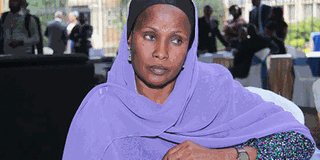Women win in new Senate appointments

Isiolo Senator Adan Dullo Fatuma who was appointed Deputy Senate Majority Leader in the House realignment. PHOTO | FILE | NATION MEDIA GROUP
Women have emerged as the major beneficiaries in Senate leadership changes announced by the ruling Jubilee Party last week.
In a meeting chaired by President Uhuru Kenyatta and attended by 20 senators at State House, Nairobi, the party resolved to elect new Senate leadership two of who are women.
Senators Fatuma Dullo Adan (Isiolo) and Farhiya Ali Haji (Nominated) were picked as Deputy Senate Majority Leader and Deputy Senate Chief Whip respectively.
The duo will deputise West Pokot Senator Samuel Poghisio and his Murang’a counterpart Irungu Kang’ata who were elected as the new Senate Majority Leader and Majority Chief Whip respectively.
The offices of the Majority Leader and Majority Chief Whip are some of the most powerful and influential in the Senate.
The Senate majority leader is among others obliged to spearhead the legislative agenda of the largest party or coalition of parties in the Senate.
RESPECTIVE PARTIES
Ms Dullo will, therefore, be deputising in spearheading the legislative agenda of Jubilee.
She will also be expected to ensure senators of their respective parties attend House business particularly when there is contentious business to be transacted with a view to ensuring each party’s policy stance/agenda is passed.
Together with the Majority Chief Whip, she will be expected to select senators from their respective parties to serve in committees and enforce party discipline among senators as well as disciplining the errant ones.
Political experts say the appointment of the two female senators is a deliberate balancing act to ensure there is gender parity in the Senate leadership more so, after the removal of Senator Susan Kihika as the majority whip.
Ms Dullo is a woman of many firsts. She is the first elected woman Senator of Isiolo County.
At 22 years, she made history by serving as the first female District Officer from the Borana Community. She later served as a commissioner at the Kenya Human Rights Commission.
In the run up to the 2017 elections, Ms Dullo, weathered stiff opposition from a section of elders opposed her candidature citing cultural beliefs.
On her part, Senator Ali, who is an alumni of Alliance Girls, holds an executive MBA from Unites States International University (USIU).
She also holds a Bachelor of Commerce degree in Accounting from the University of Nairobi and a diploma in Business Management from the same university.
Before joining politics, she worked at Oxfam GB Kenya as a director in-charge of operations.
President Kenyatta assured the new House leaders of his support.
"His Excellency the President congratulated the new Jubilee Coalition Senate leaders and assured them of his support. The President who is also the Party Leader of the Jubilee Coalition said he looks forward to working closely with the new Senate Leadership in delivering services to Kenyans.
TWO-THIRDS RULE
Senate Speaker Ken Lusaka approved the leadership changes that now paves way for the newly elected to take office.
Lusaka’s decision to approve the leadership changes took effect even as immediate former majority leader Kipchumba Murkomen and Ms Kihika contested the changes, saying due process was not followed.
Women in the country have been complaining for not been considered by their male counterparts in House leadership positions, many of which have been dominated by men.
Apart from sharing of House leadership positions, women have also been demanding that the two-thirds gender rule, which was entrenched in the new Constitution, be enacted in order to achieve gender parity in elective leadership, public service and the private sector.
The Constitution demands that women occupy at least one third of all seats in Parliament and one third of all appointed political positions.
This is far from the current reality, which has seen the government challenged on its dedication in bridging the gender gap in politics.
Currently, out of the 349 seats in Parliament, only 76 members are female. According to the Constitution, Parliament should at least have 117 female members of parliament. The Senate too, misses the mark with only 21 women owning seats instead of the 23 demanded by law.
Last year, women legislators called on Commonwealth Parliaments to open up more space for women participation in governance and in the decision making process.
Speaking when they congregated for the opening ceremony of the Commonwealth Women Parliamentary Conference at the on-going 64th Commonwealth Parliamentary Conference in Uganda, the women leaders lamented that across the Commonwealth fraternity, women issues have not been embraced as national issues.
The women leaders who said they have continued to be marginalised in politics, called for more action that will see them attain more positions.





